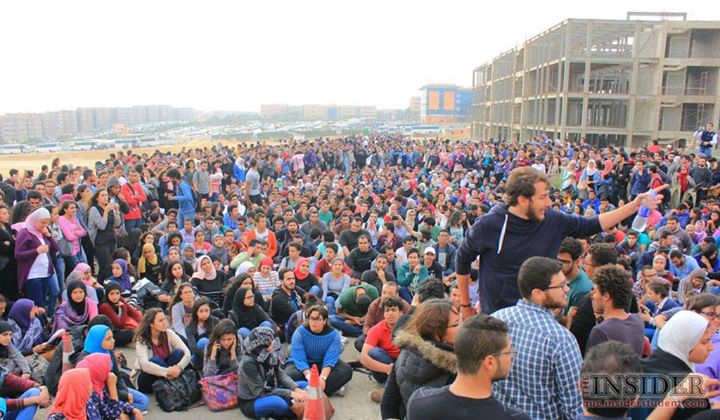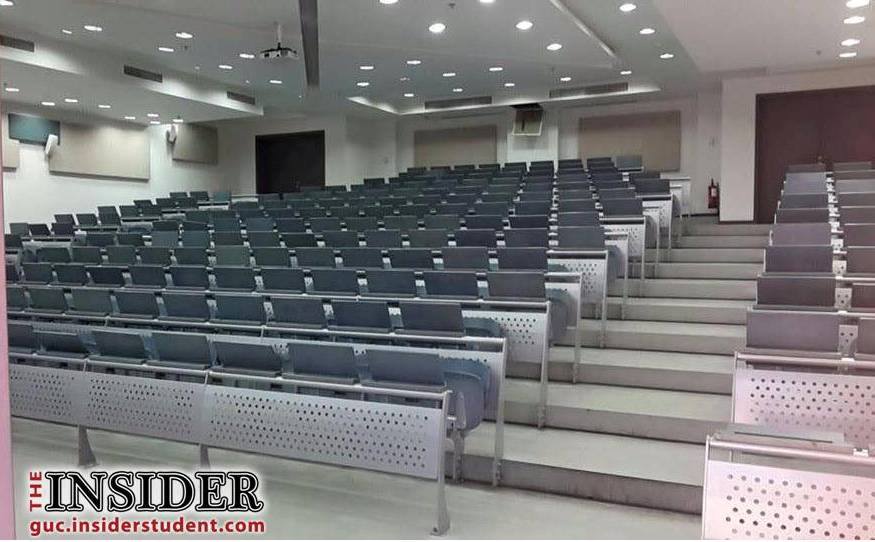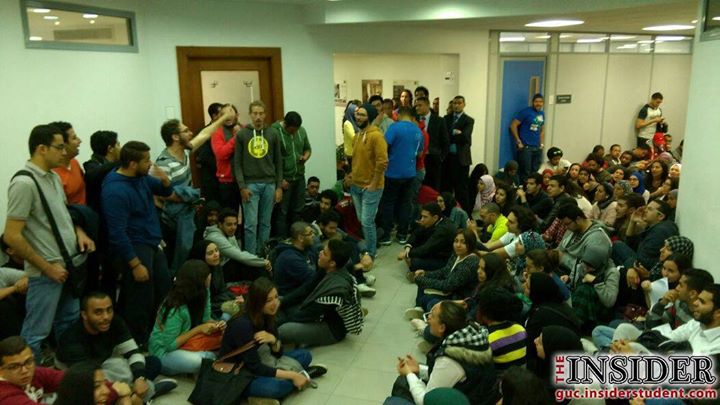The past two weeks have marked the most turbulent period of time since the German University in Cairo was established. For those of you who haven’t heard, on Mar. 9, GUC student Yara Tarek Negm was hit by a GUC bus on campus.
Now, there is no question about the amount of sadness and grief that her loss brought to every student and human being who heard the news. However, it was the aftermath of her death that brought on events the GUC has never witnessed before.
Upon hearing the news of Yara’s departure, a number of GUC students took to protesting and sitting in on the following day. They wanted appropriate action by the university’s administration both to honor Yara’s memory and to ensure that everyone responsible for her death was adequately punished. Demands further developed into requesting basic safety measures and emergency strategies to ensure such tragedy won’t be repeated.
However, the administration refused to answer or even comment on students’ demands. It was that deafening silence that triggered the first spark of friction that would later explode into a 10-day period of protests, sit-ins, boycotting of midterms and overall disturbance in every possible sector of the university’s life.

Now, one thing must be noted: This is not the first time that the students have presented demands that are nothing but reasonable only to be met with silence or refusal, at best. The sit-in, the boycotting and all the actions involved were not just for Yara. They weren’t even for the list of demands by the students.
This was the result of a a very deep-rooted pile up of distrust, disappointment and frustration that students repeatedly experience from administration’s actions, or lack thereof.
Students also marched to the buses’ gates to prevent buses from moving until they heard some sort of reply from the administration. Nobody thought this was going to work. We thought it would just be another futile attempt at being heard. However, it wasn’t.
The students were able to stop two rounds of buses from moving and the university finally announced a three-day mourning period for Yara’s death.
As the university administration turned a blind eye – or rather, a deaf ear – to students’ demands, the number of students multiplied and the sit-in grew bigger and angrier. We were so angry at everything and everyone.
We were angry at Yara’s death, which must have been the ten-thousandth death of a young soul in this country.
We were angry it happened on our very own campus.
We were angry at the shortcomings of the security personnel and clinic team that should have immediately rushed to her aid.
We were angry at the abysmal ambulance standards that couldn’t rescue her in time.
We were angry that her spilled blood on the buses’ platform was burned before the police could investigate.
We were angry at the administration’s inaction towards the whole incident.
We were angry at the fact that when we voiced our anger, we were ignored.
We were angry that we were being framed for practicing “emotional terrorism”!
We were angry at the GUC president when he shouted to his driver to run over the president of our student union.
Ultimately, we were angry that our administration could not even bother to contain our anger.
However, we also felt more powerful than we have ever felt before as a student body. The number of students at the sit-in was unprecedented; almost every student union or body from across the country showed their utmost support to our demands and our cheers were getting louder and braver by the second.
This was one of the very few times that a large number of students at the GUC came together for a cause, with one single voice and one message: that we would not leave until our demands were heard and met, even if just by an initial blueprint or timeline.
The most powerful the sit-in felt was when more than 85% of the students boycotted the first day of midterms. But in the following days, other factors challenged our resolve.

We were pressured by our parents, who were scared that we were sabotaging our futures by defying the administration and boycotting our midterms. We received almost-daily statements by the university’s administration saying that academic activities were carrying on perfectly normally – turning that deaf ear ever more deaf and causing some of us to fear that we were headed to a dead end.
And while some of us unwaveringly stuck to our stances from day one, others were fighting a daily inner battle. Most of us were growing more uncertain, more tired and more scared by the second.
“What will happen when midterms are over?” all of us wondered. Most of us could not afford to boycott all academic activities for the rest of the semester, because that would automatically mean failing courses. It seemed like it had no end.
Whether we supported the cause or not and whether we actively participated or not, all of our lives were put on hold in anticipation of what would happen the next day, hour, or even minute. It all felt like a simplified version of the Jan. 25 revolution. It certainly put us in the same emotional state – or more accurately, roller-coaster.
While the pressure caused a reduction in the number of students boycotting the second and the third day of midterms, the majority still boycotted (56% on the second day and 70% on the third, according to the official page of GUC’s student union). It really did feel too good to be true. And it probably was.

The whole thing ended abruptly and in mysterious conditions after a certain meeting between the student union, the administration and a committee from the Ministry of Higher Education and the Supreme Council of Universities.
Later on, the administration announced that they would redo the exams (something they repeatedly stated would be impossible during the sit-ins) provided that students would file a petition, signed with their national security numbers, stating the reasons of their absence.
Now, we don’t know how this whole thing will be remembered by the majority of the public. And, to be honest, it doesn’t matter in the end which side of the story you believe. History is, after all, written by the most powerful. This all happened, and it was very real. And it will forever remain true, at least in the minds of those who experienced it firsthand.
We walked out of this experience feeling many things, most of which are never welcome. We felt frustrated. We felt oppressed. We felt hopeless. We even felt careless. We felt isolated from those who govern us. We felt that if change was ever going to be made, it wasn’t going to be anytime soon. And most of us felt like we couldn’t wait to leave.
At least we still managed to practice our ingrained Egyptian sense of humor:
WE SAID THIS: May Yara rest in peace.


